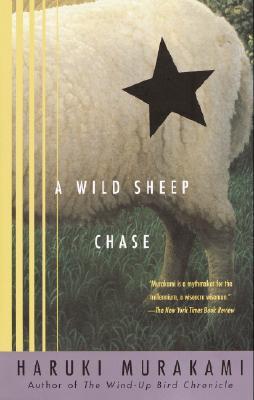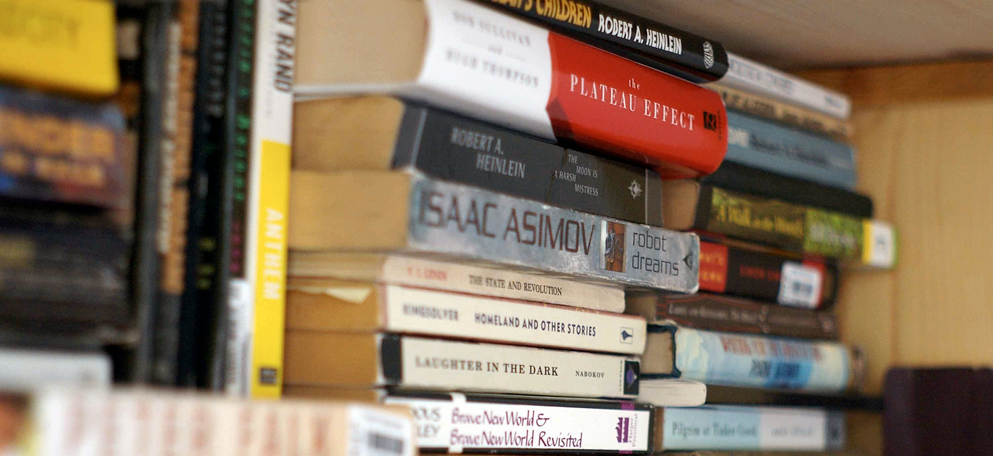
A marvelous hybrid of mythology and mystery, A Wild Sheep Chase is the extraordinary literary thriller that launched Haruki Murakami’s international reputation.
It begins simply enough: A twenty-something advertising executive receives a postcard from a friend, and casually appropriates the image for an insurance company’s advertisement. What he doesn’t realize is that included in the pastoral scene is a mutant sheep with a star on its back, and in using this photo he has unwittingly captured the attention of a man in black who offers a menacing ultimatum: find the sheep or face dire consequences. Thus begins a surreal and elaborate quest that takes our hero from the urban haunts of Tokyo to the remote and snowy mountains of northern Japan, where he confronts not only the mythological sheep, but the confines of tradition and the demons deep within himself. Quirky and utterly captivating, A Wild Sheep Chase is Murakami at his astounding best.
Quotes and thoughts while reading:
Two things of note - this book miraculously showed up in my PO Box from my Uncle Joe - which was an amazing thing to happen. And there is a note on the first page that reads: "Joe, hopefully this one doesn't give you nightmares. enjoy, chris." Which I thought was illuminating and worrying at the same time. Questions popped up into my mind of "Is this a scary book - will it give me nightmares - what am I to expect" to then popping up questions of "Maybe past Murakami books have given Joe nightmares(they certainly have for me), so maybe this one is especially tame". So with that loaded onto your minds, as it was to me, let's jump in.
"From the photo albums, every single print of her had been peeled away. shows of the both of us together had been cut, the parts with her neatly trimmed away, leaving my image behind. Photos of me alone or of mountains and rivers and deer and cats were left intact. Three albums rendered into a revised past. It was as if I'd been along at birth, alone all my days, and would continue alone." (p 24) There is an amazing series called "Black Mirror" - a new age futuristic twilight zone - and it has a Christmas special with a story similar to this. In it, people can have an implant in their eye(actually the show makes it seem like everyone has this implant and that it isn't really a choice - it's dystopian) that is like a layer on top of reality. But one of the benefits(?) is that if you don't want someone to see you - or be allowed to look at you - you can block them. Then any time you look at a photograph of them you see static noise in the outlined shape of the person. The point of this retelling is to focus on the life shattering effect this could have on someone. To have all the pictures - all the physical manifestations of your memory - wiped out, would be shocking and devastating. I think it's amazing how natural Murakami's characters feel. And I think it is the exact way in which they feel natural that when all the magical elements in his stories take place you still feel like it could be real. It seems out of place - but then the character is so normal that it seems possible.
One of my issues with writing about Murakami's books is that I don't want to give too much away. I think the process of discovering these things as you read is crucial to the world enveloping that he achieves. But I do have to mention how enrapturing "the girlfriends" ears are(I also find it interesting how no one really has names in this book - I had to look it up to make sure I wasn't missing anything - most of the characters in the book really don't have names). The telling of them, and their magical and control over the world - how she isn't her true whole self when they are away - and how careful she has to be when she "takes them out" - it was all fascinating to imagine. I loved thinking about being in a restaurant with her - and watching as the room fell silent and people turned when she showed her ears.
The recurring motif of the sheep emblem - before you know the whole story of the sheep itself(and in case you were wondering - the title is both literal and figurative - the sheep represents more than the sheep - but the protagonist is still objectively looking for a sheep) was great in it's capacity to leave you wondering why it keeps popping up - to notice when the sheep emblem is there - and to wonder what the hell is going on / going to happen.
Page 167 brings in the classic Murakami sex scene - it's something to keep in mind when reading a Murakami book - that if you're in public you've got to be careful. You could spontaneously become flushed for no apparent reason to the folks around you.
I also love the idea - and find it fascinating - of visiting a town that is on the verge of dying. A mountain town that is only(really) accessible by train - and how commerce leaves it. It's great because as the story pulls away from the city and society as a whole - you can pull away from reality. You can lose all sense of what makes sense - because you aren't in a big city anymore. I feel like being in a big city lends a bit of predictability - but in a small country town - really anything could happen.
"I was barely awake, but even if I were totally lucid, this - and everything that was happening to me - was far beyond my realm of comprehension. There was almost nothing one could do except let things take their course."(p 287) This is partly where Murakami's strength lies - his character is totally willing to admit that all this that is happening is ridiculous - because it is. But in the admittance - comes a sense of reality.
I think one of the things that I like most about Murakami is that I don't hate his endings. I rarely like an ending to a book - and this one didn't end too happily - but it was a good ending. An ending that fit the book and the characters in it. I hate it when a book just ends - or when it starts to feel rushed at the end. If you write an 800 page book you better damn well not rush the ending - and I don't feel like Murakami does that. I'm incredibly grateful that Murakami came into my literary life - it's better for it.
© JKloor 2016 Books
